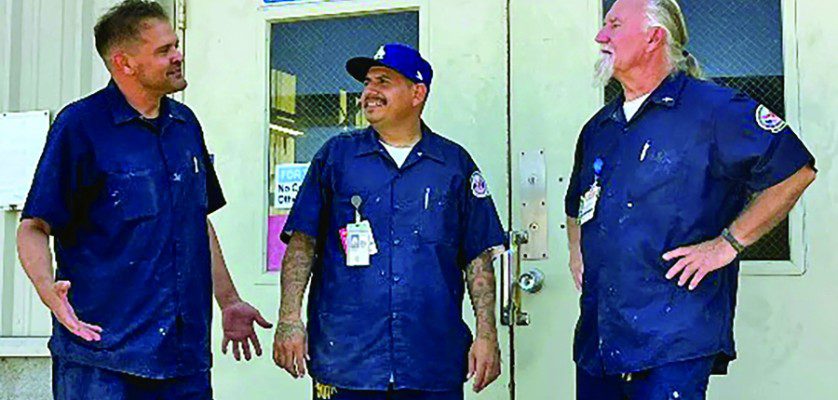As the lead carpenter at West Los Angeles VA, Army veteran Daniel Martin takes great pride in fixing things. He repairs drywall, hangs doors and generally beautifies the hospital for patients, staff and visitors.
He also repairs the lives of other veterans by serving as a mentor through Vocational Rehabilitation, helping those with disabilities overcome barriers to employment.
Martin is all too familiar with the challenges of adjusting to civilian life. Before the former felon found his calling as a mentor and carpenter, he struggled with homelessness and didn’t know if he’d ever be given a second chance.
With help from VA, Martin transformed his life. Now he wants other veterans who are having a tough time to know: “You can do this.”
Peacetime trauma
Entering the military at 17, Martin served as a supply specialist. As he tells it, he enlisted as a boy and left a man, experiencing some traumatic episodes along the way.
“So many of the peacetime soldiers won’t even advocate for themselves in any way because they think they have to be a combat veteran,” said Martin. “But we veterans all have our struggles.”
After completing his tour of duty, he started running with biker gangs and using drugs. He eventually ended up doing a couple of stints in jail. That’s where he first heard about VA services ó from members of the Veteran Justice Outreach program.
Upon his release, he bounced from couch to couch, having no real home of his own. Eventually, he decided to come to Greater Los Angeles VA.
Carpentry had been Martin’s longtime civilian trade, and he put those skills to work with the Vocational Rehabilitation Compensated Work Therapy (CWT) program, which helps veterans living with mental or physical health issues obtain and maintain gainful employment.
His work performance earned him a permanent position with the engineering team. His supervisor, Andrew Lee, said Martin is the first ex-felon veteran the department has ever hired. “Danny is motivated and humble. He gets along with everybody,” Lee said.
P.J. Stigers ó section chief for Vocational Rehabilitation, and whose position includes all aspects of the CWT program ó praised Martin for his leadership qualities.
“His willingness to openly discuss his own struggles, setbacks and triumphs has created a sense of camaraderie and unity within the group. His empathetic nature and ability to connect with his peers on a personal level have made him an invaluable asset,” Stigers said.
After Martin’s time living on campus, he found permanent, supportive housing in Tarzana, Calif., through the HUD-VASH program. HUD-VASH pairs subsidized rent vouchers from HUD with supportive services from VA. Two years ago, he moved into an apartment he secured on his own.
Mentoring other veterans
For the four years he’s been in engineering, Martin said he has been mentoring other CWT veterans, helping them get back on their feet and learn crucial employment skills. Many have landed their own jobs with VA.
“I go out of my way to try to make this thing fun. I just want them to do well,” he said.
His leadership skills have been beneficial for numerous other veterans, helping them navigate the CWT experience and move on in their careers. And, he also recently received a promotion to work leader carpenter, making his mentorship role official.
Lee hopes Martin’s story can encourage other departments to hire veterans. “This is a veteran hospital. You have veterans in your backyard. Many of them just need a second chance,” Lee added.
For Martin, that second chance changed his life. “I am so grateful to VA because they provided me with a starting point and gave me some tools. A little bit of courage, a little bit of strength. I got lucky,” Martin said.










